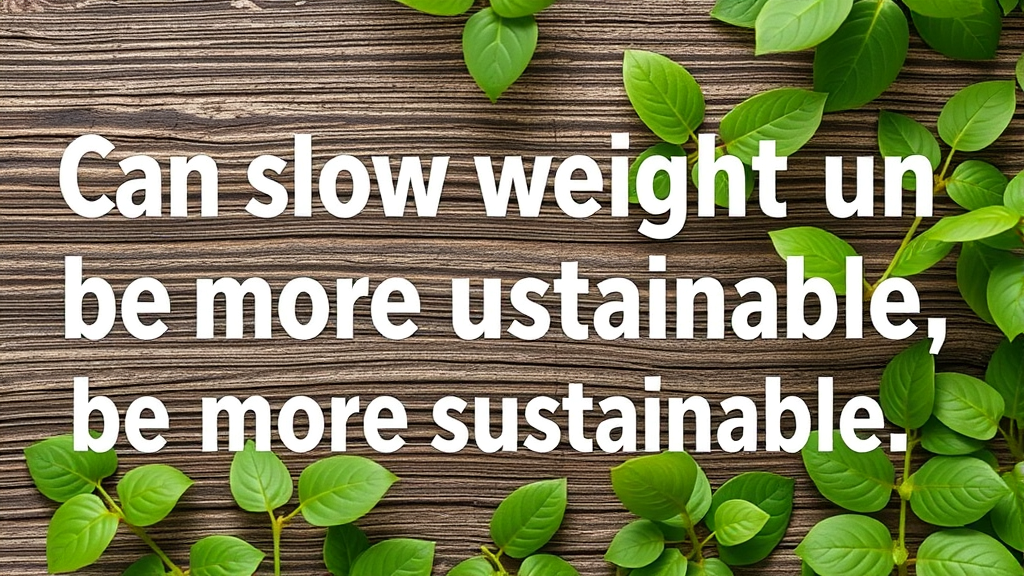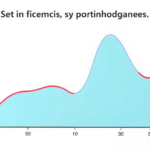The Benefits of Slow Weight Loss for Long-Term Success
When embarking on a weight loss journey, you may find yourself wondering about the best approach to achieve your goals. While the allure of rapid weight loss can be tempting, there’s a growing body of evidence suggesting that slow weight loss may be not only more sustainable but also healthier in the long run. Here are some key benefits of adopting a gradual weight loss strategy.
Gradual Change
Slow weight loss encourages you to make gradual lifestyle changes rather than drastic overhauls. This approach allows you to:
- Develop healthier eating habits
- Incorporate regular physical activity into your routine
- Adapt to a new lifestyle comfortably
When changes happen gradually, they become more manageable. You’re less likely to feel overwhelmed, which makes it easier to stick to your new habits.
Better Nutritional Choices
With slow weight loss, you have the opportunity to focus on a balanced diet filled with essential nutrients. Quick fixes often promote restrictive diets that can lead to deficiencies. Instead, consider these nutritional benefits:
- Diverse food intake: A slow process allows you to explore various healthy foods, ensuring your body gets a wide range of nutrients.
- Mindful eating: You have more time to practice mindful eating, which can help you listen to your body’s hunger cues.
- Sustainable habits: Long-term changes in eating habits can lead to sustained weight loss and improved overall health.
Enhanced Psychological Well-Being
Pursuing a slower weight loss journey can benefit your mental health significantly. When you focus on losing weight at a manageable pace, you can:
- Reduce feelings of deprivation and frustration, leading to a more positive relationship with food.
- Build confidence as you reach smaller, achievable milestones.
- Reduce stress associated with rapid weight loss, which can lead to yo-yo dieting.
By concentrating on gradual progress, you are more likely to experience long-lasting motivation.
Maintenance of Lean Muscle Mass
Another essential advantage of slow weight loss is the maintenance of lean muscle mass. When you lose weight too quickly, the body can also shed muscle, not just fat. This is detrimental because:
- Muscle is metabolically active, meaning it helps you burn more calories at rest.
- Higher muscle mass can enhance physical performance and fitness.
Slower weight loss tends to preserve muscle mass, leading to healthier body composition changes.
Improved Lifestyle Changes
By aiming for gradual weight loss, you can incorporate small, sustainable lifestyle changes that support your overall health. This could include:
- Consistent exercise routines that become enjoyable rather than a chore.
- Better sleep habits, which are often overlooked but crucial for weight management.
- Improved hydration, increasing water intake can significantly impact weight loss efforts.
Increased Success Rates
Research suggests that those who lose weight slowly are more likely to maintain their weight loss over time. A study published on NCBI indicates that quick weight loss often leads to gaining back lost weight plus more, while steady progress helps cement new habits and lifestyle choices that stick.
Alternative Options and Reputation for Success
The slow weight loss approach also opens up a wide array of options for support and guidance that cater to long-term success. This includes:
- Nutritionists: Get personalized meal plans and dietary advice.
- Fitness trainers: Receive tailored exercise regimens that suit your pace and preferences.
- Support groups: Join communities that share experiences and foster motivation.
Taking the time to focus on slow weight loss lays down the foundation for healthier lifestyle choices, increases motivational success, and fosters a more positive attitude towards weight management. Achieving your goals doesn’t have to be a race; instead, embracing a thoughtful approach towards weight loss can lead to lasting results.
For more information on sustainable weight loss strategies and the principles of a balanced diet, check out Eat Right and Choose My Plate.
How Slow Weight Loss Affects Your Metabolism
Understanding the relationship between weight loss and metabolism can significantly influence your wellness journey. When embarking on a weight loss plan, you might wonder how the speed at which you shed pounds affects your body’s metabolic processes. Many experts argue that slow weight loss may offer distinct advantages, promoting healthier long-term habits and potentially enhancing your metabolic health.
One of the key reasons slow weight loss can be beneficial lies in its impact on your metabolism. Rapid weight loss often leads to muscle loss along with fat loss. Muscles are metabolically active tissues that burn calories even at rest. As you lose muscle, your resting metabolic rate (RMR) tends to decline, making it harder to maintain your weight. In contrast, slow weight loss, which focuses on a gradual reduction in body fat, allows you to retain more muscle mass. This preservation is crucial because a higher muscle mass correlates with a higher RMR, helping you burn more calories day-to-day.
Here are some significant effects of slow weight loss on your metabolism:
- Muscle Preservation: Gradual weight loss generally promotes a repatterning of fat, allowing for more significant muscle retention.
- Better Hormonal Balance: Slow weight loss can help you maintain hormones like leptin and ghrelin, which regulate hunger and metabolism.
- Increased Insulin Sensitivity: Taking time to lose weight might enhance your body’s sensitivity to insulin and improve metabolic health.
- Long-Lasting Changes: Adopting slower trends often leads to more sustainable lifestyle changes, reducing the likelihood of weight regain.
Maintaining a healthy metabolic rate is vital for energy levels and overall well-being. When you lose weight too quickly, your body may perceive this as a threat, triggering protective mechanisms that slow down your metabolism. This is often referred to as “metabolic adaptation.” It can lead to challenges later on when trying to maintain your weight loss or achieve further weight loss goals.
Moreover, slow weight loss promotes healthier lifestyle choices. When you take the time to implement gradual changes, such as improving dietary habits or increasing physical activity, you tend to create a weight loss regimen that is more sustainable. Here are some strategies to consider for a slow and steady approach to weight loss:
- Focus on Nutrition: Concentrate on consuming whole foods, including lean proteins, whole grains, fruits, and vegetables.
- Set Incremental Goals: Target a weight loss of 1-2 pounds per week, which can lead to lasting results.
- Regular Physical Activity: Incorporate strength training and cardiovascular exercise to preserve muscle mass and promote fat loss.
- Hydrate Effectively: Drinking enough water is crucial for metabolism and helps manage hunger levels.
Additionally, the psychology of weight loss cannot be overlooked. When you accept that losing weight is a gradual process, you’ll likely feel less pressure to achieve unrealistic standards. This mindset can lead to better adherence to your plan and reduced stress levels, both of which can positively impact your metabolism.
To further understand how slow weight loss can impact your metabolism and body composition, several studies highlight the importance of taking your time. Research indicates that slower weight loss often results in better long-term outcomes, mitigating the chances of weight regain. For more information, you can check studies from organizations such as the National Institutes of Health and The Journal of Clinical Endocrinology & Metabolism.
In crafting a plan that promotes slow weight loss, remember to be patient with your progress. Sustainable weight loss is a journey, and fostering positive, long-lasting habits ultimately leads to better metabolic health and well-being. If you’re thinking about starting a weight loss journey or need insights into your current plan, consider reaching out to a healthcare professional or registered dietitian. They can tailor strategies that not only optimize your metabolic rate but also fit your lifestyle and individual needs.
Emotional and Psychological Aspects of Gradual Weight Loss
The journey toward weight loss is often viewed through a purely physical lens, but emotional and psychological factors play a significant role as well. A gradual approach to weight loss can lead to more sustainable results because it often aligns better with your mental and emotional well-being. When you take your time shedding pounds, you allow your body and mind to adjust and adapt, creating a more harmonious balance.
Firstly, the psychological aspect of gradual weight loss allows for the development of healthier habits. Instead of focusing on restrictive diets or quick fixes, you can create a balanced eating pattern that fits into your lifestyle. This method encourages mindfulness about what you eat, fostering positive relationships with food. When you learn to appreciate food’s nutritional value rather than viewing it as an enemy, you’re more likely to maintain healthy eating habits over the long run.
Emotional factors are equally important. Many individuals struggle with emotional eating—using food as a coping mechanism for stress, anxiety, or sadness. Gradual weight loss creates the opportunity to explore these emotional triggers without resorting to guilt or shame. By recognizing and addressing emotions tied to eating, you can develop healthier coping strategies, such as exercising, journaling, or talking to a friend when you feel overwhelmed.
Another significant benefit of a slow weight loss process is building self-efficacy. This term refers to your belief in your ability to succeed in specific situations. When you lose weight at a gradual pace, you often experience small wins along the way, which can bolster your confidence. Celebrating these milestones reinforces your commitment to your goals and encourages you to persist even when challenges arise.
Moreover, a gradual approach to weight loss allows for greater psychological adaptation. Rapid changes in weight can lead to feelings of deprivation or anxiety about maintaining those losses. In contrast, a slow and steady process fosters a sense of stability. You can focus on your overall well-being without the pressure of a ticking clock, helping to reduce feelings of stress associated with weight loss.
Consider some emotional benefits related to a slower weight loss journey:
- Enhanced self-esteem: As you make progress, you’re likely to feel more positive about your abilities and self-image.
- Resilience: Gradually overcoming obstacles helps build mental strength, preparing you to face future challenges.
- Reduced emotional eating: Awareness of emotional triggers can empower you to make better choices.
- Stronger support systems: Engaging in communities or groups that emphasize gradual change can enhance feelings of belonging.
Developing a positive mindset is also vital. Approaching weight loss with a flexible and forgiving attitude helps you handle setbacks. Instead of perceiving a minor indulgence or a week of slower progress as failure, view it as part of your journey. This flexibility not only contributes to better emotional health but also aids in preventing destructive all-or-nothing thinking patterns.
To better understand the connection between emotional well-being and gradual weight loss, consider this data collected from various studies:
| Emotional Factor | Impact on Weight Loss |
|---|---|
| Self-Efficacy | Higher confidence leads to consistent efforts. |
| Emotional Eating | Better management reduces unnecessary calorie intake. |
| Stress Management | Lower stress levels correlate with more effective weight loss. |
| Support Systems | Encouragement from others facilitates adherence to health goals. |
Developing emotional resilience during a gradual weight loss journey can empower you to navigate other areas of life more effectively. Embracing the process can build a stronger foundation for not just physical health but mental and emotional well-being as well.
In wrapping up, while the scale may only show slow changes, remember that your emotional and psychological progress is invaluable. By focusing on gradual weight loss, you can create sustainable habits that enrich your life long after you reach your goal. For more information on the psychological aspects of weight loss, consider visiting Psychology Today or Verywell Mind.
The Role of Lifestyle Changes in Sustainable Weight Management
Achieving sustainable weight management is less about quick fixes and more about the integration of lasting lifestyle changes. When you consider long-term health, it becomes essential to adopt habits that can be maintained indefinitely. This approach not only aids in weight loss but also promotes overall well-being. Understanding how these lifestyle changes contribute to sustainable weight management can help you make informed decisions that lead to a healthier life.
A key component in fostering a sustainable weight management journey is nutrition. Shifting to a balanced diet rich in whole foods can have a significant impact. Here are some vital aspects to consider:
- Whole Fruits and Vegetables: Aim to fill your plate with a variety of colors from fruits and vegetables. These foods are low in calories but high in nutrients, helping keep you full and energized.
- Lean Proteins: Incorporate sources of lean protein such as chicken, fish, legumes, and nuts. Protein aids in muscle repair and growth while also keeping you satisfied longer.
- Healthy Fats: Opt for healthy fats found in avocados, nuts, and olive oil. They contribute to satiety and can help with nutrient absorption.
Mindful eating is another crucial lifestyle change that can lead to sustainable weight management. This practice is about being present during meals and recognizing hunger cues. Some techniques include:
- Eating slowly to savor each bite.
- Paying attention to feelings of hunger and fullness.
- Avoiding distractions such as phones or television during meals.
Physical activity is essential for weight management as well. Regular exercise not only burns calories but also boosts metabolism. Here’s how to incorporate more movement into your daily routine:
- Find Activities You Enjoy: Whether it’s dancing, swimming, or walking, enjoy what you do to keep consistent.
- Set Realistic Goals: Start with small, achievable goals like 30 minutes of activity 5 days a week.
- Be Active Throughout the Day: Take stairs instead of elevators, walk during breaks, or engage in yard work.
In addition to physical changes, cultivating a supportive environment plays a significant role in sustainable weight management. Your surroundings can either support or hinder your progress. Here are some tips:
- Surround Yourself with Support: Engage friends and family who encourage your healthy lifestyle choices.
- Limit Temptations: Keep unhealthy snacks out of the house and stock up on healthier options.
- Prepare for Challenges: Plan for social events by bringing healthy dishes or deciding in advance what you will eat.
Another often-overlooked aspect of weight management is mental well-being. Stress can lead to emotional eating and unhealthy choices. To combat this, consider:
- Practicing Relaxation Techniques: Incorporate mindfulness, meditation, or yoga into your routine to help manage stress.
- Getting Enough Sleep: Aim for 7-9 hours of quality sleep each night, as it’s essential for weight management and overall health.
Educate yourself about nutrition and weight management. Staying informed can empower you to make better choices. Resources such as [ChooseMyPlate.gov](https://www.choosemyplate.gov/) provide guidelines on healthy eating and portion sizes. Another valuable resource is [Nutrition.gov](https://www.nutrition.gov/), where you can access a variety of dietary information.
By adopting these lifestyle changes, you can create a foundation for sustainable weight management that goes beyond diets and temporary fixes. Instead, focus on integrating healthier habits into your everyday life, paving the way for lasting results that improve your overall health and well-being.
Comparing Slow and Fast Weight Loss: What’s Better?
Weight loss is a common goal for many, and there are different approaches to achieve it. Two popular methods are slow and fast weight loss. While one might seem more appealing than the other, the effectiveness and longevity of results can vary greatly. Understanding the differences can help you make an informed choice for your health journey.
Fast weight loss often promises quick results through drastic calorie restriction, intense workouts, or fad diets. While you may shed pounds quickly, there are several factors to consider:
- Initial Results: You might see a significant drop on the scale early on. This can be motivating and reinforce your commitment.
- Muscle Loss: Rapid weight loss can lead to muscle loss, which can slow down your metabolism. Maintaining muscle mass is crucial for overall health.
- Nutrient Deficiencies: The restrictive nature of fast weight loss can limit essential nutrients in your diet, leading to health problems.
- Sustainability: Many people find it hard to maintain a fast weight loss diet long-term, leading to weight regain once normal eating patterns resume.
In contrast, slow weight loss typically involves losing one or two pounds per week through moderate changes in eating habits and physical activity. Here’s why this approach can be more beneficial:
- Healthier Habits: Slow weight loss encourages the development of sustainable eating and exercise habits that can last a lifetime.
- Fat Loss vs. Muscle Loss: This gradual approach tends to preserve muscle mass, leading to a healthier body composition.
- Reduced Risk of Regain: You are less likely to regain the weight you lose when you adopt habits that are maintainable long-term.
- Improved Well-Being: Taking your time with weight loss allows you to focus on making health improvements instead of obsessing over the number on the scale.
When comparing these two methods, the key lies in your personal goals, preferences, and lifestyle. Here’s a simple comparison table that highlights their pros and cons:
| Aspect | Fast Weight Loss | Slow Weight Loss |
|---|---|---|
| Speed of Results | Quick | Gradual |
| Maintenance | Harder to sustain | Easier to maintain |
| Nutritional Balance | Often deficient | Balanced |
| Muscle Preservation | Lower | Higher |
| Health Impact | Potentially harmful | Generally safe |
It’s essential to remember that our bodies are different. While some may thrive on a fast approach, many find that slower progress leads to better results in long-term health benefits. If you’re unsure which method suits you best, it may be helpful to consult a healthcare provider or a registered dietitian. They can offer guidance tailored to your unique situation.
There are various resources available online that can provide additional insights into weight loss strategies. Websites such as NCBI are excellent starting points for research on health and nutrition, while CDC offers CDC-backed guidelines for safe weight loss practices.
Whether you lean towards fast or slow weight loss, ensuring that you choose a method that aligns with your lifestyle and health goals is crucial. Prioritize sustainable habits for long-term success and well-being on your weight management journey. Remember, the process is as significant as the results.
Effective Strategies for Maintaining Motivation During Slow Weight Loss
If you’re striving for weight loss but finding progress slower than expected, staying motivated can be challenging. However, maintaining your motivation during a slow weight loss journey is crucial for long-term success. Here are effective strategies that can help you stay engaged and committed to your goals.
Track Your Progress
Keeping a detailed log of your weight loss journey can significantly boost your motivation. This doesn’t only include tracking your weight but also measuring inches lost or noting how your clothes fit. Consider using a mobile app or a simple notebook to record:
- Weekly weight changes
- Measurements of waist, hips, arms, and thighs
- Fitness milestones (like running longer distances or lifting heavier weights)
- Personal reflections on how you feel
Seeing your progress over time can remind you of how far you’ve come and encourage you to keep going.
Set Realistic Goals
Setting attainable short-term goals is important, especially for those experiencing slow weight loss. Aim for goals that are specific, measurable, and achievable. For example:
- Loss of 1-2 pounds per week
- Exercising three times a week
- more vegetables into meals
These smaller goals help you focus on progress rather than perfection, and hitting these targets can provide a sense of accomplishment that fuels further motivation.
Celebrate Small Victories
Recognizing and rewarding yourself for meeting your goals, no matter how small, can propel your motivation. Treat yourself with non-food rewards, such as:
- A new workout outfit
- A massage
- A day off to relax
Celebrating small victories can create a positive feedback loop, encouraging you to stay committed to your weight loss journey.
Stay Connected with Support Systems
Surrounding yourself with supportive friends and family can significantly enhance your motivation. Share your goals with them and encourage them to check in on your progress. You can also consider joining a community group or an online forum where you connect with others who are on similar journeys. Websites like Double Chocolate Hungry offer forums and support groups that can help you stay engaged.
Focus on Mindfulness
Mindful eating can be a powerful tool during a slow weight loss journey. Pay attention to your hunger cues, savor each bite, and avoid distractions while eating. Implement mindfulness practices such as:
- Journaling your food intake and feelings
- Meditation for stress relief
- Deep breathing exercises when cravings arise
Focusing on your body and its needs helps you develop a healthier relationship with food, which can support your weight loss efforts.
Exercise Variety
Staying physically active is crucial regardless of weight loss speed. Keep your workout routine exciting by trying different types of exercise such as:
- Group classes (like Zumba or yoga)
- Outdoor activities (like hiking or biking)
- Strength training with free weights or resistance bands
Variety not only enhances physical fitness but also keeps your motivation high as you explore new ways to move your body.
Rest and Recovery
Don’t overlook the power of rest in your weight loss journey. Giving your body time to recover is essential for muscle building and overall well-being. Make sure to prioritize:
- Getting sufficient sleep (7-9 hours) each night
- Taking rest days between intense workouts
- relaxation techniques such as yoga
Rest can prevent burnout and keep your motivation levels steady.
Stay Informed and Inspired
Reading success stories and keeping updated with helpful resources can offer you new insights and strategies. Consider following reputable sites like Choose My Plate for nutrition tips or the CDC’s physical activity guidelines. Learning from others who have achieved their weight loss goals can inspire you and remind you that persistence pays off.
Remember, slow and steady often translates to lasting change. By implementing these strategies, you can maintain your motivation and make your slow weight loss journey a positive experience. Every step counts, no matter how small!
Nutritional Guidelines for Achieving Slow Weight Loss
Achieving slow weight loss can be an effective and sustainable way to improve your health without overwhelming your body. When it comes to nutritional guidelines, focusing on whole, nutrient-dense foods is key. This not only supports weight loss but also ensures your body receives the essential vitamins and minerals it needs to function optimally.
Here are some guidelines to help you achieve slow weight loss through nutrition:
Focus on Whole Foods
Whole foods are unprocessed or minimally processed items that offer the most nutritional value. a variety of whole foods into your diet is crucial. Some examples include:
- Fresh fruits and vegetables
- Whole grains such as brown rice and quinoa
- Lean proteins, including chicken, turkey, and legumes
- Healthy fats like avocados, nuts, and olive oil
Prioritize Protein Intake
Protein plays an essential role in weight loss. It helps you feel full longer which can prevent overeating. Here’s how to incorporate more protein into your meals:
- Include a source of protein in every meal.
- Opt for snacks that are rich in protein, such as Greek yogurt or a handful of almonds.
- Choose legumes and beans regularly; they are an excellent, plant-based protein source.
Monitor Portion Sizes
Paying attention to portion sizes helps manage caloric intake without giving up favorite foods. Here are some tips:
- Use smaller plates to help control portions.
- Learn to read food labels for serving sizes.
- Practice mindful eating by focusing on your meal and enjoying every bite.
Stay Hydrated
Staying hydrated is often overlooked but essential for weight loss. Water assists in digestion, metabolism, and can curb hunger. Here’s how to incorporate hydration into your day:
- Drink a glass of water before meals to reduce hunger.
- Carry a reusable water bottle to encourage regular intake.
- Add herbs or fruits to your water for a refreshing twist.
Limit Added Sugars and Refined Carbs
Reducing added sugars and refined carbohydrates can greatly impact your weight loss journey. These foods often lack nutrients and can lead to increased cravings. To limit these:
- Choose whole fruits instead of fruit juices.
- Swap white bread for whole grain or sprouted grain options.
- Read labels to identify added sugars in processed foods.
Make Balanced Meals
Creating meals that are balanced with macronutrients can enhance your feeling of satisfaction. Each plate should ideally contain:
| Food Group | Recommended Portion |
|---|---|
| Lean Proteins | 1/4 of your plate |
| Whole Grains | 1/4 of your plate |
| Vegetables | 1/2 of your plate |
| Healthy Fats | Small amount, as needed |
By focusing on these nutritional guidelines, you can successfully pursue slow weight loss and create sustainable habits for the long term. For more information, check out Eat Right or Nutrition.gov.
Remember that everyone’s journey is unique and it’s essential to find what works best for you. Slow and steady wins the race when it comes to weight loss!
Key Takeaway:
Key Takeaway: The Case for Slow Weight Loss as a Sustainable Strategy
The journey towards weight loss is often viewed through the lens of immediate results. However, when we examine the multifaceted components of weight management, it becomes clear that slow weight loss can offer substantial benefits for long-term success. One of the most significant advantages is that it tends to be more sustainable. Gradually shedding pounds allows your body to adapt and ensures that you are not depriving yourself, which decreases the likelihood of regaining the weight.
When you lose weight slowly, your metabolism adjusts at a steadier pace, preventing the metabolic slowdown often associated with rapid weight loss. This means that your body becomes adept at burning fat without entering starvation mode, which can happen when you engage in extreme diets. Therefore, choosing a gradual approach can have a positive impact on your body’s natural processes, maintaining energy levels and fostering overall well-being.
Emotional and psychological aspects also play a crucial role in how we perceive weight loss. Rapid changes can lead to frustration and may not address underlying psychological factors related to food and body image. On the other hand, slow weight loss encourages a healthier relationship with food as it emphasizes the importance of self-compassion and resilience over perfectionism. Learning to celebrate small victories can greatly boost your mental outlook, keeping you motivated and focused on long-term goals.
Lifestyle changes is another integral component of a sustainable weight loss journey. These changes can include improved nutritional guidelines that prioritize whole foods while allowing for treats in moderation. Establishing a balanced approach to eating ensures that you fuel your body adequately while creating habits that stick.
Comparing the efficacy of slow versus fast weight loss reveals that the former often leads to more lasting results. Moreover, by implementing effective strategies for maintaining motivation—such as engaging in physical activities you enjoy and seeking support from friends or communities—you can champion your journey more effectively.
Embracing slow weight loss is a wise choice for anyone looking to achieve a healthier body and mind while ensuring those changes are sustainable for years to come. The benefits ripple through not just your physical health, but also your emotional well-being and lifestyle, setting a foundation for lasting success.
Conclusion
Choosing a slower approach to weight loss can pave the way for lasting results, promoting a healthier relationship with food and your body. The benefits of gradual weight loss extend beyond just the numbers on a scale; they include a more stable metabolism and enhanced emotional well-being. Metabolically, slow weight loss allows your body to adjust, helping prevent the common pitfalls of rapid weight loss, like muscle loss and metabolic slowdown.
On an emotional level, taking the time to shed pounds can mitigate feelings of deprivation and stress, fostering a more positive mindset about weight management. This transformation occurs through sustainable lifestyle changes that integrate better habits into your daily routine rather than relying on temporary fixes. These changes often involve adopting a balanced diet and consistent physical activity, which naturally enhances long-term weight maintenance.
When comparing slow and fast weight loss, the evidence leans heavily in favor of patience. Abrupt diet shifts might yield quick results but often lead to rebound weight gain. To stay motivated during this gradual process, it’s essential to set realistic goals, celebrate small victories, and lean on support systems.
Implementing nutritious guidelines can turn the slow weight loss journey into a rewarding experience, allowing you to enjoy delicious foods while making progress. Ultimately, embracing a steady pace not only promotes physical changes but also cultivates mental resilience and healthier lifestyle habits, setting you up for sustainable success on your weight loss journey.







Leave a Reply